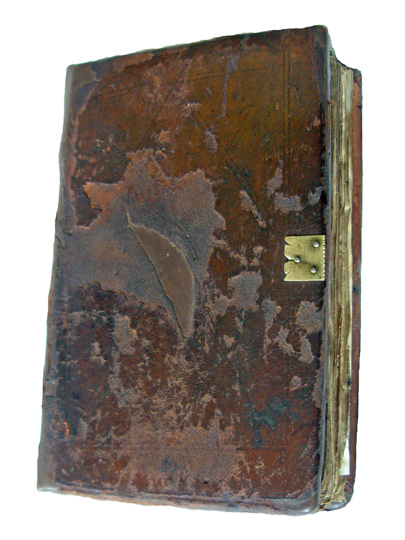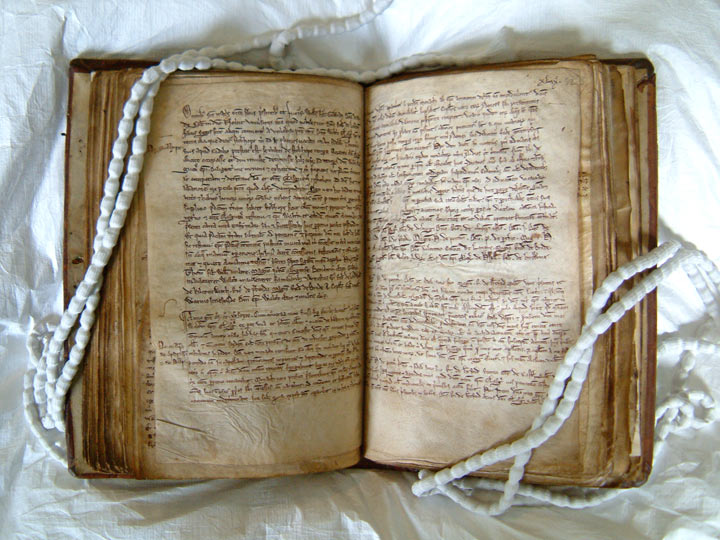REGISTRUM VETUS ECCLESIA
GLASGUENSIS
 The
book in the photograph on the left is the Registrum Vetus Ecclesia Glasguensis
- Latin for the Old Register of the Church of Glasgow. It is a chartulary of documents
belonging to the medieval Diocese of Glasgow between the twelfth and fifteenth
centuries, making it over 800 years old. Within it, folio 48, from the year 1226
and shown in the photograph below, contains the earliest known reference to a
Catholic Church in Ardrossan. Titled 'De Ecclesiis de Ardrossan et de Dalri',
it describes an agreement between the Archbishop of Glasgow and the Abbot of Kilwinning
whereby the Archbishop granted the Abbot a pension payable from the Church of
Ardrossan. The Registrum Vetus is held in the Scottish
Catholic Archives in Edinburgh.
The
book in the photograph on the left is the Registrum Vetus Ecclesia Glasguensis
- Latin for the Old Register of the Church of Glasgow. It is a chartulary of documents
belonging to the medieval Diocese of Glasgow between the twelfth and fifteenth
centuries, making it over 800 years old. Within it, folio 48, from the year 1226
and shown in the photograph below, contains the earliest known reference to a
Catholic Church in Ardrossan. Titled 'De Ecclesiis de Ardrossan et de Dalri',
it describes an agreement between the Archbishop of Glasgow and the Abbot of Kilwinning
whereby the Archbishop granted the Abbot a pension payable from the Church of
Ardrossan. The Registrum Vetus is held in the Scottish
Catholic Archives in Edinburgh.
Translated into English, folio 48 states:
Concerning
the Churches of Ardrossan and Dalry
In the Year of Grace 1226Although
a dispute had arisen over several points between the Lord Walter, Bishop of Glasgow,
on the one side, and Abbot John and the Convent of Kilwinning, on the other, at
length, on the advice of common friends, it was settled in this manner.
The
said Bishop, out of a feeling of love, has granted to the said Abbot and Convent
sixteen shillings in name of pension, to be taken from the Church of Ardrossan,
by the hand of the minister thereof; and the said monks have entirely abandoned
the plea which they had instituted regarding the Church of Dalry, seeking it as
a Chapel; renouncing all that had been, or might be, obtained in that matter for
ever; so that henceforth they shall trouble neither the Bishop nor the clerk holding
the said Church, in regard to that which shall for ever remain a mother Church.
 The
foresaid monks also shall present to the Bishop suitable chaplains for the Churches
granted to them for their own proper use, whenever they shall be vacant, with
a lawful and sufficient sustentation, indeterminately. However, if any defect
should afterwards appear from the uncertain and indeterminate sustention, and
if the foresaid monks, after being admonished by the bishop, do not remedy the
defect, the said bishop shall reasonably supply what is needed from the Churches
themselves. Furthermore he shall receive without delay from them the suitable
chaplains presented to him without reasonable contradiction. Indeed those of their
vicars making any complaints against them which they cannot prove, shall be lawfully
punished. And if any of the vicars who are presented to the Bishop shall in course
of time be found unsuitable, or despise the performance of due residence, they
may be lawfully proceeded against by the Bishop; and this same rule shall be observed
in reference to vicars previously ordained.
The
foresaid monks also shall present to the Bishop suitable chaplains for the Churches
granted to them for their own proper use, whenever they shall be vacant, with
a lawful and sufficient sustentation, indeterminately. However, if any defect
should afterwards appear from the uncertain and indeterminate sustention, and
if the foresaid monks, after being admonished by the bishop, do not remedy the
defect, the said bishop shall reasonably supply what is needed from the Churches
themselves. Furthermore he shall receive without delay from them the suitable
chaplains presented to him without reasonable contradiction. Indeed those of their
vicars making any complaints against them which they cannot prove, shall be lawfully
punished. And if any of the vicars who are presented to the Bishop shall in course
of time be found unsuitable, or despise the performance of due residence, they
may be lawfully proceeded against by the Bishop; and this same rule shall be observed
in reference to vicars previously ordained.
He has also granted that if
the vicars of the same monks shall not pay the pension due to them within forty
days after their term, they shall then be suspended from their office and benefice
by himself or his officials and deans, by his authority, until payment is made.
When the vicars of the foresaid churches resign or die, the custody of the churches
shall remain in the hands of the bishop until the ordination of vicars; however,
on the occasion of that custody, there shall be no loss to the monks of what they
legally ought to receive in these churches. Moreover they shall observe in their
Parish Churches sentence of excommunication or interdict which the Bishop has
passed in their Parish on reasonable grounds; saving the privileges and authentic
writings of both parties and Diocesan Canon Law.
The present composition
is conformed by the seals of the parties for greater security and to obtain due
firmity before these witnesses
Hugh,
Abbot of Dryburgh
Lord Richard of Ancrum
Official
Lord J, Dean of Clydesdale
Lord
R of Prebenda
Master H of Potton
Lord P of Partick
Masters H and A, Chaplains
of the Lord Bishop
Lord Valentine, Canon of Lanark
Master Radulph of Brade
Master
Ingram
Robert, Walter, Andrew clerks of the Lord Bishop
Alexander of Hersille
Robert
of Irvine
and many others
 The
foresaid monks also shall present to the Bishop suitable chaplains for the Churches
granted to them for their own proper use, whenever they shall be vacant, with
a lawful and sufficient sustentation, indeterminately. However, if any defect
should afterwards appear from the uncertain and indeterminate sustention, and
if the foresaid monks, after being admonished by the bishop, do not remedy the
defect, the said bishop shall reasonably supply what is needed from the Churches
themselves. Furthermore he shall receive without delay from them the suitable
chaplains presented to him without reasonable contradiction. Indeed those of their
vicars making any complaints against them which they cannot prove, shall be lawfully
punished. And if any of the vicars who are presented to the Bishop shall in course
of time be found unsuitable, or despise the performance of due residence, they
may be lawfully proceeded against by the Bishop; and this same rule shall be observed
in reference to vicars previously ordained.
The
foresaid monks also shall present to the Bishop suitable chaplains for the Churches
granted to them for their own proper use, whenever they shall be vacant, with
a lawful and sufficient sustentation, indeterminately. However, if any defect
should afterwards appear from the uncertain and indeterminate sustention, and
if the foresaid monks, after being admonished by the bishop, do not remedy the
defect, the said bishop shall reasonably supply what is needed from the Churches
themselves. Furthermore he shall receive without delay from them the suitable
chaplains presented to him without reasonable contradiction. Indeed those of their
vicars making any complaints against them which they cannot prove, shall be lawfully
punished. And if any of the vicars who are presented to the Bishop shall in course
of time be found unsuitable, or despise the performance of due residence, they
may be lawfully proceeded against by the Bishop; and this same rule shall be observed
in reference to vicars previously ordained. The
book in the photograph on the left is the Registrum Vetus Ecclesia Glasguensis
- Latin for the Old Register of the Church of Glasgow. It is a chartulary of documents
belonging to the medieval Diocese of Glasgow between the twelfth and fifteenth
centuries, making it over 800 years old. Within it, folio 48, from the year 1226
and shown in the photograph below, contains the earliest known reference to a
Catholic Church in Ardrossan. Titled 'De Ecclesiis de Ardrossan et de Dalri',
it describes an agreement between the Archbishop of Glasgow and the Abbot of Kilwinning
whereby the Archbishop granted the Abbot a pension payable from the Church of
Ardrossan. The Registrum Vetus is held in the Scottish
Catholic Archives in Edinburgh.
The
book in the photograph on the left is the Registrum Vetus Ecclesia Glasguensis
- Latin for the Old Register of the Church of Glasgow. It is a chartulary of documents
belonging to the medieval Diocese of Glasgow between the twelfth and fifteenth
centuries, making it over 800 years old. Within it, folio 48, from the year 1226
and shown in the photograph below, contains the earliest known reference to a
Catholic Church in Ardrossan. Titled 'De Ecclesiis de Ardrossan et de Dalri',
it describes an agreement between the Archbishop of Glasgow and the Abbot of Kilwinning
whereby the Archbishop granted the Abbot a pension payable from the Church of
Ardrossan. The Registrum Vetus is held in the Scottish
Catholic Archives in Edinburgh.